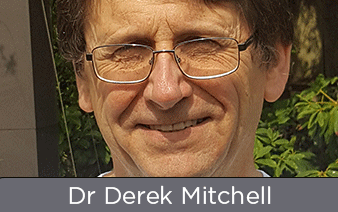
- This event has passed.
Bees Without Borders: Derek Mitchell – The Tragedy of Hives and Poor Nest Choices

19:00 – 20:15 (Geneva – Zurich time)
For other time zones use this time zone converter ( link )
Based on Derek’s research, which initially aimed to build better beehives, he will share his story of discovering unexpected results that demonstrate how honey bees are intimately connected to the performance of their beehives and natural nests. He concludes his talk by discussing the tragedy of how some research and beekeeping practices still have not grasped that beehives and nests are integral to honey bees’ well-being.
Biography
Dr. Derek Mitchell researches the heat transfer of man-made and natural honeybee nests at the School of Mechanical Engineering, University of Leeds, where he recently completed his PhD with a thesis entitled “The Thermofluid Engineering of the Honeybee Nest (Apis mellifera)”. He has had articles published in BeeCraft, Bee Culture, American Bee Journal, and Natural Beekeeping, in addition to his published academic work in the Royal Society Journal and International Journal of Biometeorology.
Derek’s curiosity about honey bees and heat started when his wife, Elaine, bought their first hive in 2010. His physics and engineering background told him that what they had been told about honey bees and hives wasn’t the complete story. This curiosity has resulted in his groundbreaking and often controversial research into honey bees.
Some of his work has been cited by Prof. Thomas D. Seeley, the foremost authority on honey bee ecology, as the “Best source of information about the differences in insulation value between tree cavities and standard wooden hives and about the effects of these differences on the energetics of colony thermoregulation”. Seeley has included Derek’s research in his latest book “The Lives of Bees: The Untold Story of the Honey Bee in the Wild”.
Professor Adam Hart, an entomologist from the University of Gloucestershire who co-presented BBC2’s series “Hive Alive” about honeybees, said, “This research is fascinating – winter losses have become a feature of beekeeping and hive design could be a simple way to help honeybees. It is amazing to think that a practice adopted in the War to save wood might be contributing to the losses that beekeepers experience”.
The research, apart from publications, has also led to speaking engagements at academic conferences and beekeeping groups, including Apimondia 2019, National Honey Show, BBKA Spring Conventions, and over 60 local beekeeping associations.
Publications:
Mitchell, D.M., 2024. Are man-made hives valid thermal surrogates for natural honey bee nests (Apis mellifera)? Journal of Thermal Biology 122, 103882.
https://doi.org/10.1016/j.jtherbio.2024.103882
Mitchell, D.M., 2024. Thermofluid Engineering of the Honey bee (Apis Mellifera) nest (PhD Thesis). University of Leeds, Leeds UK.
https://etheses.whiterose.ac.uk/34266/
Mitchell D (2023) Honeybees cluster together when it’s cold – but we’ve been completely wrong about why The Conversation November 24, 2023
https://theconversation.com/honeybees-cluster-together-when-its-cold-but-weve-been-completely-wrong-about-why-218066
Mitchell, D.M. (2023) Honey Bee Cluster – not insulation but stressful heat sink
Journal of the Royal Society Interface.
Mitchell, D.(2022) Honey bee ( Apis mellifera ) size determines colony heat transfer when brood covering or distributed,” Int. J. Biometeorol., vol. Accepted for publication.
Mitchell, D. (2019). Thermal efficiency extends distance and variety for honey bee foragers: Analysis of the energetics of nectar collection and dessication by Apis mellifera. Journal of the Royal Society, Interface, 16(20180879). https://doi.org/10.1098/rsif.2018.0879
Mitchell, D. (2019). Thermal Efficiency. Bee Culture, (April), 61–63.
Mitchell, D. (2019). To save honey bees we need to design them new hives
The Conversation September 9, https://theconversation.com/to-save-honey-bees-we-need-to-design-them-new-hives-121792
Mitchell, D. (2019). Nectar, Humidity, Honey bees (Apis mellifera) and Varroa in summer: A theoretical thermofluid analysis of the fate of water vapour from honey ripening and its implications on the control of Varroa destructor. Journal of the Royal Society, Interface, 22 May. https://doi.org/10.1098/rsif.2019.0048
Mitchell, D. (2017). The DerekM Board. BeeCraft, (July), 15–17.
Mitchell, D. (2017, April). Putting a Number on Natural. Natural Bee Husbandry, (3), 4–9.
Mitchell, D. (2017). Honey bee engineering: Top ventilation and top entrances. American Bee Journal, 157(8), 887–889.
Mitchell, D. (2016). Ratios of colony mass to thermal conductance of tree and man-made nest enclosures of Apis mellifera: implications for survival, clustering, humidity regulation and Varroa destructor. International Journal of Biometeorology, 60(5), 629–638. https://doi.org/10.1007/s00484-015-1057-z
Mitchell, D. (2016). Winter Stresses on Honey Bees. BeeCraft, (jan).
Participation in the conference is free of charge. Sign up below to receive the link and be informed about our next events:
